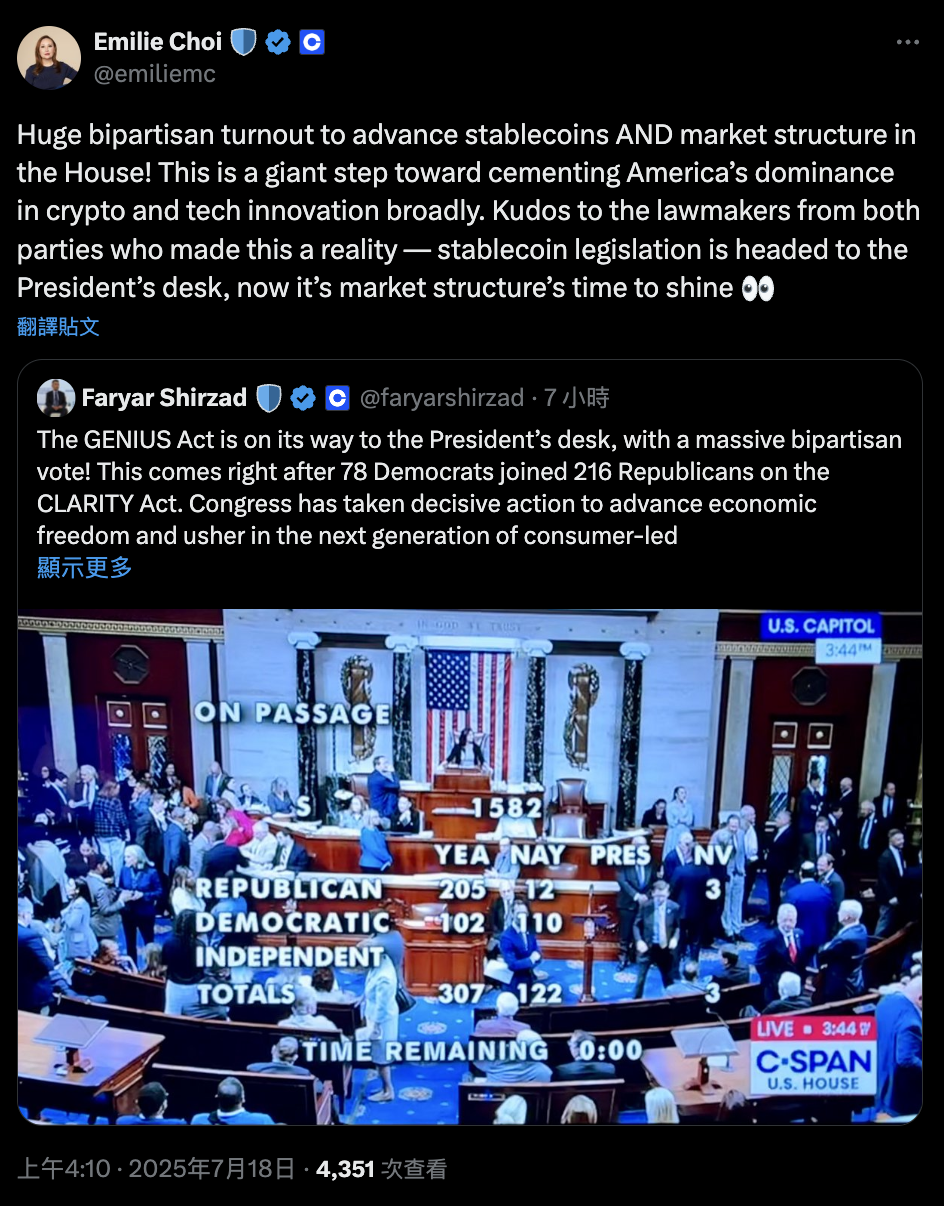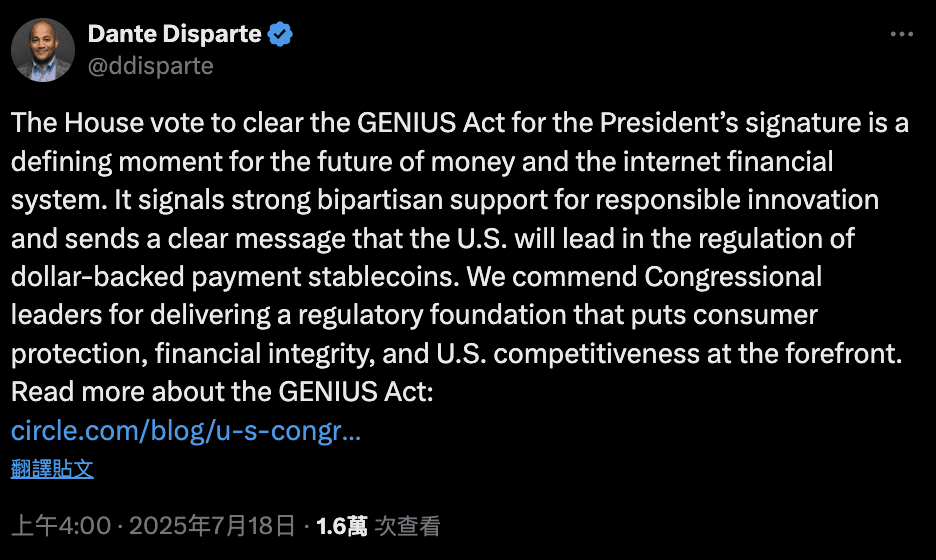The House passed three major bills, and the GENIUS Act is set to become the first cryptocurrency law.
The U.S. House officially passed three important cryptocurrency bills on July 17, laying the foundation for the U.S. digital asset regulatory framework.
The Digital Asset Market Clarity Act (CLARITY Act) passed with 294 votes in favor and 134 against.
The U.S. National Innovation Guidance Establishment Act for Stablecoins (GENIUS Act) passed with 308 votes to 122.
The Anti-CBDC Surveillance State Act passed narrowly with 219 votes to 210.
 Source: US House Clerk The three major cryptocurrency bills have all passed after voting in the House.
Source: US House Clerk The three major cryptocurrency bills have all passed after voting in the House.
The GENIUS Act has already passed in the Senate with 68 votes to 30 and will now be sent directly to President Trump’s desk for signing, expected to become the first significant cryptocurrency law in U.S. history. The White House has scheduled a signing ceremony for Friday, symbolizing the official opening of a new era of cryptocurrency regulation in the U.S.
The bill requires stablecoin issuers to be 100% backed by U.S. dollars or equivalent liquid assets, with issuers having a market capitalization of over $50 billion required to undergo annual audits and establish foreign issuance guidelines.
The CLARITY Act will proceed to the Senate for review, aiming to establish a comprehensive regulatory framework for cryptocurrencies and clearly delineate the regulatory authority of the Securities and Exchange Commission (SEC) and the Commodity Futures Trading Commission (CFTC).
The bill requires digital asset companies to provide retail financial disclosure information and separate corporate and customer funds. The Anti-CBDC Act will prevent the Federal Reserve from directly issuing central bank digital currency to individuals, and this bill will be included in the Defense Authorization Act to increase its chances of passing.
Bipartisan support exceeded expectations, with many Democratic members shifting toward support.
The voting results show unexpected bipartisan cooperation, with 78 Democratic members supporting the CLARITY Act, and over 100 Democratic members supporting the GENIUS Act. This number greatly exceeds the Democratic support during last year’s House discussions of similar bills, indicating that cryptocurrency regulation is gradually gaining bipartisan consensus.
House Financial Services Committee Chairman French Hill praised President Trump, House Speaker Mike Johnson, and other Republican leaders for helping to advance the digital asset agenda, calling it an important step toward America's digital asset 'golden age.' Senate Banking Committee Chairman Tim Scott stated that the passage of the GENIUS Act symbolizes a significant milestone in ensuring America's leadership in the payment innovation industry while protecting consumers and strengthening national security.
However, House Financial Services Committee Democratic leader Maxine Waters remains strongly opposed to these bills, calling the CLARITY Act and the GENIUS Act 'the most dangerous legislation,' criticizing these bills as 'invitations for Trump to continue his comprehensive cryptocurrency fraud.' Waters is particularly concerned about the Trump family's personal interests in the cryptocurrency industry, with Bloomberg estimating that Trump and his family profited approximately $620 million from cryptocurrency ventures.
The industry unanimously hailed the clear regulatory framework as the biggest positive.
The cryptocurrency industry expressed enthusiastic welcome for the passage of the bills. Blockchain Association CEO Summer Mersinger stated, 'Through these three votes, Congress has sent a clear message: The U.S. is ready to lead in the digital finance industry through thoughtful bipartisan policymaking.' Cryptocurrency Policy Innovation Committee CEO Ji Hun Kim called the passage of the CLARITY Act a 'milestone,' replacing uncertainty with confidence and providing assurance for entrepreneurs, the broader market, and consumers.
Coinbase President Emilie Choi stated on social media, 'The massive bipartisan support advances the stablecoin and market structure bills! This is an important step in consolidating the U.S. position in the cryptocurrency and broader technology innovation industry.'
 Source: X/@emiliemc Coinbase President Emilie Choi stated that this is an important step in consolidating the U.S. position in the cryptocurrency and broader technology innovation industry.
Source: X/@emiliemc Coinbase President Emilie Choi stated that this is an important step in consolidating the U.S. position in the cryptocurrency and broader technology innovation industry.
Circle Policy and Operations Officer Dante Disparte pointed out that the House vote shows strong bipartisan support for responsible innovation, sending a clear message that the U.S. will take a leadership role in the regulation of dollar-backed payment stablecoins.
 Source: X/@ddisparte Circle Policy and Operations Officer Dante Disparte stated that the House vote shows strong bipartisan support for responsible innovation.
Source: X/@ddisparte Circle Policy and Operations Officer Dante Disparte stated that the House vote shows strong bipartisan support for responsible innovation.
SEC Chairman Paul Atkins stated that the GENIUS Act provides 'clear rules of the game,' and he looks forward to seeing the market utilize the regulatory framework provided by the bill to launch faster, cheaper, and safer payment stablecoin solutions while maintaining robust risk protection measures. However, according to a report from CoinDesk, Chuck Bell of the Consumer Reports organization warned that the GENIUS Act fails to provide reasonable expectations of protections for consumers using similar digital cash products.
Senate review becomes crucial, with the goal of completing legislation by the end of September.
With the GENIUS Act set to be signed into law, the fates of the CLARITY Act and the Anti-CBDC Act will depend on the Senate review. Senate Banking Committee Chairman Tim Scott set a goal to complete digital asset market structure legislation by September 30, stating that the House's work will provide a 'strong template.'
However, the Senate may draft its own version rather than directly adopting the House version. Reports suggest that the Senate version is more likely to be based on the work already completed by Senators Cynthia Lummis and Kirsten Gillibrand. Due to its partisan nature, the Anti-CBDC Act has a smaller chance of gaining bipartisan support in the Senate, and thus will be included in the Defense Authorization Act, which is seen as 'must-pass.'
President Trump played a key role in pushing these bills through, especially in negotiating with opposing Republican members on Tuesday night, ultimately persuading them to change their stance. The success of this 'Crypto Week' symbolizes a significant turning point for U.S. cryptocurrency policy, providing unprecedented regulatory clarity for industry development and expected to attract more traditional financial institutions into this sector.
See more developments on 'Crypto Week'.
The U.S. House kicks off 'Crypto Week' on 7/14! What are the three major cryptocurrency bills? Will they pass?
Democrats launch Anti-Crypto Corruption Week! Fighting against Congressional Crypto Week, could there be variables for the stablecoin bill?
U.S. Crypto Week hits a snag! House procedural vote fails, are the votes on three major bills postponed?
U.S. Crypto Week turns into a political mystery! Did Trump’s pressure fail? Why have Congressional divisions worsened?
'The Dawn of a New Era for U.S. Cryptocurrency! Three Key Bills Passed, Major Impact on the Industry at a Glance' was first published on 'Crypto City'.
